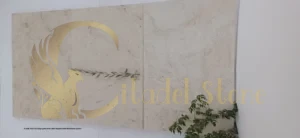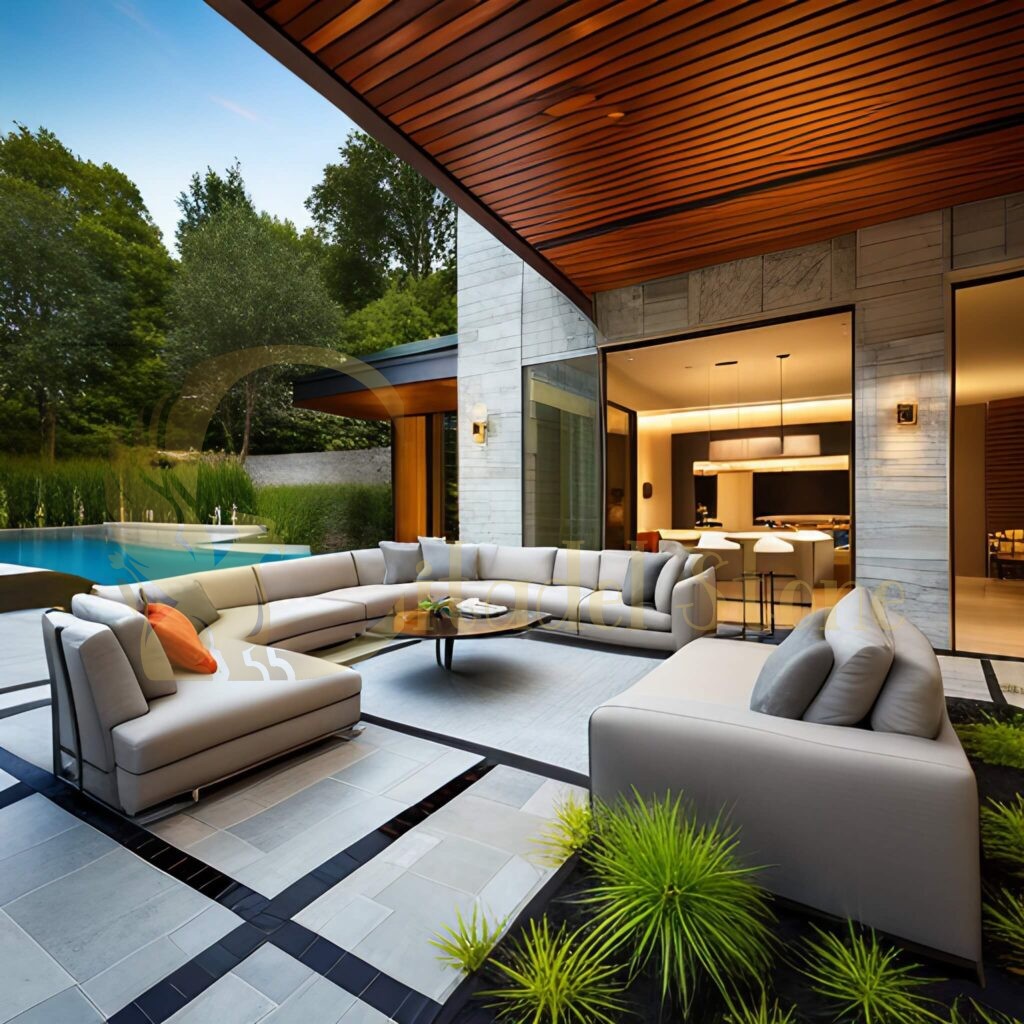Quick answer — which is right for your project?
White limestone pavers excel when natural beauty, low-maintenance color stability, and premium aesthetics justify higher initial investment. They suit high-visibility residential courtyards, luxury pool decks, and branded commercial entries where unique veining and timeless elegance drive design value. Concrete pavers offer cost-effective, engineered consistency ideal for large-format commercial hardscape, municipal streetscape, and budget-conscious residential driveways where uniform appearance and predictable pricing matter most. Both materials perform well when properly specified and installed; your choice hinges on aesthetic priority, budget envelope, and willingness to invest upfront for lower long-term maintenance—the core trade-off in white limestone pavers vs concrete pavers.
Materials overview — what are we comparing?
White limestone pavers — material origin, visual & physical properties
White limestone is a natural sedimentary stone quarried primarily from Indiana, Texas, and imported sources in Europe and the Middle East. Each paver exhibits unique fossil marks, vein patterns, and tonal variation—hallmarks of geological authenticity. Surface finishes range from honed and tumbled to brushed and split-face, offering designers textural control. Porosity and hardness vary by quarry strata; reputable suppliers provide technical data sheets (TDS) documenting water absorption, compressive strength, and freeze-thaw ratings for each batch. Natural stone delivers unmatched color permanence under UV exposure and develops a lived-in patina that many clients prize.
Concrete pavers — manufacturing process, mix variations
Concrete pavers are factory-molded from Portland cement, aggregate, pigment, and proprietary admixtures. Standard-duty units serve pedestrian and light vehicular loads; high-performance blends incorporate polymer modifiers and denser aggregate for enhanced abrasion resistance and reduced permeability. Manufacturing tolerances ensure dimensional consistency, simplifying large-scale installation. Color is achieved through integral pigment or surface treatments, but UV degradation and efflorescence can alter appearance over time. Concrete’s engineered uniformity appeals to projects prioritizing predictable cost and rapid procurement.
Key differences at a glance:
- Appearance: Limestone offers natural variation and timeless elegance; concrete delivers uniform, replicable patterns.
- Color stability: Limestone resists UV fading; concrete pigments may fade or effloresce.
- Porosity: Varies by limestone type (consult TDS); concrete typically has lower absorption in high-performance mixes.
- Sourcing: Limestone is quarry-specific; concrete is regionally manufactured with shorter lead times.
- Edge detail: Limestone allows custom fabrication; concrete is limited to mold profiles.
Durability comparison — what matters in the field
Durability governs lifecycle performance and replacement frequency. Key criteria include abrasion resistance, compressive strength, freeze-thaw tolerance, water absorption, salt exposure resilience, UV and color stability, edge chipping susceptibility, and installation system integration.
Abrasion and wear resistance determine surface longevity under foot traffic and wheeled loads. Limestone hardness varies by formation; dense calcitic types rival concrete, while softer dolomitic stones may show wear sooner in high-traffic zones. Concrete pavers engineered to ASTM C936 typically achieve 8,000+ psi compressive strength [VERIFY specific grades], resisting surface wear in commercial applications. Buyers should request abrasion test results (e.g., ASTM C1353) and match material hardness to expected traffic intensity.
Compressive strength ensures pavers withstand vertical loads without cracking. Quality limestone exhibits compressive strengths from 4,000 to over 12,000 psi depending on quarry and bedding plane [VERIFY ranges per TDS]; high-performance concrete pavers often exceed 8,000 psi. Both materials adequately support residential driveways and light commercial loads when installed over proper subgrade and bedding.
Freeze-thaw resistance is critical in northern climates. Limestone durability hinges on water absorption (ASTM C97): low-porosity types (<3% absorption) perform well; higher-porosity stones may spall if saturated and frozen repeatedly. Concrete pavers meeting ASTM C1645 Severe Weathering grade resist freeze-thaw damage when air-entrained and properly sealed. Specifiers in freeze zones must verify test data and select low-absorption grades for both materials.
Water absorption and permeability affect staining, efflorescence, and frost damage. Limestone absorption ranges widely [VERIFY per quarry TDS]; denser varieties rival concrete. Permeable concrete pavers offer engineered drainage for stormwater management—a feature natural stone cannot replicate without joint design. Standard concrete may exhibit efflorescence (white salt deposits) if moisture migrates through the matrix; limestone typically avoids this issue but may develop surface deposits from joint sand or mortar.
Salt and chemical resistance matters for pool decks and coastal installations. Limestone is chemically inert and resists chlorine, saltwater, and deicing salts without surface degradation. Concrete can suffer surface scaling or reinforcement corrosion if exposed to chlorides over time, particularly in lower-grade mixes. Pool and marine applications favor limestone for chemical durability and slip resistance.
UV and color stability distinguish the materials. Limestone’s natural pigmentation resists fading indefinitely; any tonal shift is gradual patina development. Concrete pigments may fade under sustained UV, especially in lighter shades, and surface treatments can wear unevenly. Limestone maintains aesthetic consistency across decades with minimal maintenance—a key advantage in limestone pavers durability.
Edge chipping occurs during handling, installation, and impact. Limestone edges can be prone to micro-chipping if not chamfered; high-quality fabrication and careful handling mitigate this. Concrete edges are molded with chamfers or radius profiles to resist damage. Both materials benefit from professional installation and edge restraints.
Installation system impacts are explored in detail below, but bedding method, joint width, and drainage design profoundly affect durability for both materials.
Durability comparison table
| Criterion | Typical White Limestone Behavior | Typical Concrete Paver Behavior | Buyer Action |
|---|---|---|---|
| Abrasion resistance | Variable by quarry; dense types excellent | High-performance grades excellent; standard grades good | Request ASTM C1353 or lab abrasion data |
| Compressive strength | 4,000–12,000+ psi depending on formation | 8,000–12,000+ psi for high-performance grades | Verify TDS and match to load requirements |
| Freeze-thaw resistance | Excellent if <3% absorption; test required | Excellent if ASTM C1645 Severe grade | Require freeze-thaw test certification for cold climates |
| Water absorption | Variable; request ASTM C97 data | Typically 3–5% for standard, <3% permeable | Compare TDS absorption % to project exposure |
| Salt / chemical resistance | Excellent; inert to chlorine and deicers | Good in high-quality mixes; lower grades may scale | Specify air-entrained concrete or limestone for pools/coast |
| UV / color stability | Excellent; permanent natural color | Moderate; pigments may fade over years [ | Request UV-stable pigment warranty or choose limestone |
| Edge chipping | Moderate; custom chamfers reduce risk | Low; molded chamfers standard | Specify edge detail and professional handling protocol |
Numeric specifications and cost figures are illustrative unless accompanied by Citadel Stone technical data sheets, independent laboratory reports, or verified quotes. Contact Citadel Stone for certified data.
Cost comparison — material, installed & lifecycle cost
Cost analysis must account for raw material, fabrication, shipping, installation labor, subgrade preparation, jointing, sealing, ongoing maintenance, and replacement cycles. Lifecycle cost pavers thinking reveals that lower upfront pricing does not always equal lower total cost of ownership.
Material and fabrication costs: White limestone raw material typically ranges $3–$18/sq ft illustrative / typical range – verify with Citadel Stone depending on finish, thickness, and quarry. Custom cutting, edge profiling, and bookmatching add fabrication expense. Concrete pavers range $3–$10/sq ft illustrative / typical range – verify for standard to high-performance grades, with lower fabrication costs due to molding efficiency.
Shipping and staging: Limestone’s density and quarry distances can increase freight; concrete is regionally manufactured with shorter hauls. Budget $0.50–$2.00/sq ft illustrative – verify for limestone freight, $0.30–$1.00/sq ft illustrative – verify for concrete.
Installer labor: Both materials require skilled installation. Limestone’s variability demands more layout time for pattern and color blending; concrete’s uniformity speeds placement. Installed labor typically adds $4–$8/sq ft illustrative – verify for limestone, $3–$6/sq ft illustrative – verify for concrete, depending on site complexity and joint detailing.
Subgrade, bedding, and jointing: Costs are comparable. Proper subgrade compaction, geotextile, base aggregate, and bedding sand or mortar are material-agnostic. Polymeric or epoxy jointing may add $0.50–$1.50/sq ft illustrative – verify.
Sealing and routine maintenance: Limestone benefits from initial penetrating sealer application ($0.50–$1.50/sq ft illustrative – verify) and resealing every 3–5 years. Concrete may require sealing to control efflorescence and enhance color, with similar resealing intervals. Annual cleaning costs are comparable.
Replacement cycles: Quality limestone can endure 30–50+ years with minimal intervention; concrete pavers typically last 20–30 years before color fade or surface wear prompts replacement [VERIFY typical lifespans]. Deferred replacement represents significant lifecycle savings for limestone.
Cost comparison table
| Cost Component | White Limestone (Typical Range / Illustrative) | Concrete Pavers (Typical Range / Illustrative) |
|---|---|---|
| Material (per sq ft) | $8–$18 | $3–$10 |
| Fabrication premium | Custom cutting available; varies by detail | Minimal; molded profiles only |
| Shipping / staging | $0.50–$2.00 | $0.30–$1.00 |
| Installer labor | $4–$8 | $3–$6 |
| Sealing (initial) | $0.50–$1.50 | $0.50–$1.50 (if required) |
| Annual maintenance (est.) | $0.10–$0.30 | $0.15–$0.40 |
| Expected service life | 30–50+ years | 20–30 years |
| Total installed (typical) | $13–$30/sq ft | $7–$18/sq ft |
Numeric specifications and cost figures are illustrative unless accompanied by Citadel Stone technical data sheets, independent laboratory reports, or verified quotes. Contact Citadel Stone for certified data.
Maintenance & repair — routine tasks and major interventions
Routine cleaning for both materials involves sweeping, pressure washing (low PSI for limestone), and pH-neutral detergents. Limestone requires avoidance of acidic cleaners; concrete tolerates broader cleaning chemistry. Both benefit from periodic joint sand replenishment.
Sealing preserves appearance and simplifies stain removal. Limestone sealing intervals: every 3–5 years for pedestrian areas, 2–3 years for pool decks. Concrete sealing: every 3–5 years to control efflorescence and color fade.
Stain removal: Limestone poultices can extract oil, rust, and organic stains; professional restoration may be needed for deep penetration. Concrete stains are often surface-level and respond to degreasers or mild acids.
Joint maintenance: Polymeric sand or mortar joints require inspection and refilling as material erodes. Frequency depends on traffic and drainage.
Repair and replacement: Individual damaged limestone units can be replaced if spares are retained; concrete units are readily sourced but may not color-match aged pavers. Full replacement for limestone is rare; concrete may require section replacement after 20–25 years due to wear or fading.
Maintenance schedule (numbered list)
- Daily/weekly: Sweep debris; hose down high-traffic areas.
- Monthly: Inspect joints for erosion; top up polymeric sand as needed.
- Quarterly: Pressure wash (≤1,500 PSI for limestone, ≤2,500 PSI for concrete) [typical – verify safe pressures].
- Annually: Deep clean with pH-neutral detergent; inspect for cracks or lippage.
- Every 3–5 years: Reapply penetrating sealer; refresh joint sand or mortar [illustrative interval – verify].
- Every 10 years: Professional assessment for section repairs or releveling if settling occurs.
- 20–30 years (concrete) / 30–50 years (limestone): Evaluate full replacement vs. restoration [illustrative lifespans – verify].
Installation & system considerations that affect durability
Subgrade, bedding, edge restraints, jointing, and drainage design determine long-term performance regardless of paver material. A robust installation system prevents settling, lippage, and premature failure.
Subgrade preparation: Compact native soil or engineered fill to 95% Standard Proctor density. Install geotextile fabric to prevent aggregate migration.
Base aggregate: Use 4–6 inches of crushed stone (ASTM D2940 or equivalent) for pedestrian areas, 6–8 inches for driveways. Compact in lifts.
Bedding method: Dry-set sand bedding (1 inch screeded sand) suits both materials for flexible pavements. Mortar-set bedding over concrete slab offers rigidity for heavy loads or precise grading. Pedestal systems (adjustable supports) enable rooftop and plaza installations with integrated drainage.
Edge restraints: Aluminum, steel, or concrete edge restraints prevent lateral creep. Critical for both limestone and concrete installations.
Jointing materials: Polymeric sand locks joints and resists weed growth; epoxy joints offer maximum stability for vehicular loads. Joint width affects flexibility and drainage—consult installer and manufacturer guidance.
Drainage design: Slope pavers 1–2% away from structures; integrate trench drains or permeable base where stormwater management is required.
Installer / specifier checklist (8 bullets)
- Request and review Citadel Stone TDS for compressive strength, water absorption, freeze-thaw rating, and finish specifications before procurement.
- Require physical sample board approval by design team and owner before full order; verify color range, vein pattern, and finish consistency.
- Specify site measure and layout drawings from installer; confirm edge details, joint width, and drainage plan.
- Require batch production photos and Certificate of Analysis (COA) or Conformance (COC) from quarry or manufacturer.
- Include contractor warranty terms (typically 1–2 years) and require installer references from comparable projects.
- Specify acceptable lippage (≤1/16 inch typical) and joint tolerances.
- Require installer to submit installation plan including subgrade prep, compaction testing, bedding method, and restraint details.
- Schedule pre-installation meeting to review sample acceptance, site access, staging area, and protection protocols during cure/settlement.
Environmental & sustainability considerations
Embodied carbon varies by material sourcing and processing. Quarrying and transporting limestone incurs fuel and energy costs; local sourcing reduces impact. Concrete production involves cement calcination, a major CO₂ source, though regional manufacture and recycled aggregate content can lower footprint. Buyers should request Environmental Product Declarations (EPDs) or Life Cycle Assessments (LCAs) from Citadel Stone and concrete suppliers to compare carbon intensity.
Recyclability: Limestone is fully reusable—removed pavers can be repurposed or crushed for aggregate. Concrete pavers are recyclable as road base or fill but lose aesthetic value. Both materials support circular economy principles when salvaged properly.
Local sourcing: U.S. limestone quarries (Indiana, Texas) reduce transport emissions versus imports; concrete is typically produced within regional plants, minimizing shipping. Choose suppliers with transparent supply-chain data and third-party certifications (e.g., Natural Stone Council Member, LEED-contributing products).

Design & aesthetics — when stone wins and when concrete excels
Limestone delivers unmatched natural beauty: no two pavers are identical, and quarry-specific veining, fossil inclusions, and tonal shifts create bespoke outdoor rooms. Bookmatching slabs for seamless vein continuation elevates luxury pool decks and courtyards. Honed, tumbled, and brushed finishes offer textural variety. Pair white limestone with dark grout for dramatic contrast, or use tone-on-tone jointing for serene expanses. Uplighting accentuates surface texture and vein movement at night.
Concrete excels in projects requiring uniform color, precise dimensional modularity, or large-format repeatability. Modular concrete pavers simplify municipal streetscape and commercial plaza installation. Color-matched concrete can mimic natural stone profiles, though without geological authenticity. Decorative stamping and staining expand design options, but finishes may wear unevenly.
Best-fit scenarios:
- Limestone: Boutique hotel entries, luxury pool decks, historic restoration, high-end residential courtyards, branded retail plazas.
- Concrete: Budget-conscious driveways, large municipal sidewalks, permeable stormwater systems, projects prioritizing rapid procurement and installation.
Procurement & specification checklist
- Technical Data Sheet (TDS) documenting compressive strength, water absorption (ASTM C97 or C373), freeze-thaw cycles, and finish specifications.
- Certificate of Analysis (COA) or Certificate of Conformance (COC) from quarry or manufacturer.
- Independent laboratory test reports for load-bearing, slip resistance (COF per ASTM C1028), and abrasion (ASTM C1353 or equivalent).
- Physical sample board showing color range, vein pattern, surface finish, and edge detail for design approval.
- Batch production photographs confirming consistency before shipment.
- Installer references from three comparable projects; request site visit if feasible.
- Written warranty covering material defects (typically 1 year) and installer workmanship (1–2 years).
- Lead time confirmation and shipping/staging plan including delivery windows, off-load requirements, and on-site storage protection.
- Unit pricing breakdowns for material, fabrication, freight, and installation labor (request itemized quote).
- Availability of spare units for future repairs (recommend ordering 5–10% overage).
- Contact information for Citadel Stone technical support team for field questions during installation.
- Request for EPD or LCA documentation to support sustainability goals and LEED credits.
White outdoor pavers — Regions & major cities we serve nationwide
Citadel Stone supplies white outdoor pavers across the United States and supports projects from small residential terraces to large commercial plazas. We provide product samples, specification guidance and coordinated delivery so teams can test appearance and performance before ordering.
Note: the examples below are illustrative and do not describe specific named client projects.
Boston, MA — Salt-smart paving for historic streets
Boston’s coastal position and older streetscapes mean paving must resist salt exposure and blend with traditional materials. Typical uses include brownstone forecourts, restaurant terraces and small civic plazas where appearance and durability are both priorities. For Boston projects we recommend white limestone tiles that are low-absorption, abrasion-resistant and slip-mitigated for wet conditions. Citadel Stone supplies sample panels, freeze-thaw performance data and advice on compatible jointing for tight urban installs.
Atlanta, GA — Durable, low-maintenance surfaces for southern summers
Atlanta projects must handle humid summers, storm runoff and frequent outdoor events; common uses are rooftop gardens, restaurant patios and community courtyards. We recommend white limestone pavers that combine stain resistance with a medium texture to improve comfort and safety when wet. Citadel Stone can deliver sample kits, offer guidance on sealers appropriate for Georgia’s climate and plan deliveries to fit phased commercial schedules.

Portland, OR — Slip-resistant paving for rainy, green-city settings
Portland’s wet climate and active streetscape projects demand strong drainage and non-slip textures; typical uses include park paths, café seating zones and waterfront promenades. For Portland we advise white limestone flooring with a textured surface, low porosity to limit staining from organic debris, and detailing that promotes quick runoff. Citadel Stone provides sample boards, recommendations for surface finishes and guidance on jointing that supports sustainable, permeable designs.
Baltimore, MD — Tough, weather-ready paving for mixed urban use
Baltimore projects often combine heavy foot traffic with maritime exposure—common uses are waterfront walkways, hotel courtyards and commercial forecourts. For Baltimore we suggest white limestone paving tiles with good compressive strength, low water uptake and finishes that resist salt-related deterioration. Citadel Stone offers technical data on long-term performance, sample delivery and logistical planning to ensure timely arrival for larger commercial shipments.
Minneapolis, MN — Freeze-thaw resilient pavers for seasonal extremes
Minneapolis projects must withstand very cold winters, snow-clearing and de-icing salts; typical uses include plaza paving, pedestrian thoroughfares and institutional entries. For these conditions we recommend white limestone paving slabs that are frost-resistant, low-absorption and abrasion-tolerant to reduce cracking and surface flaking. Citadel Stone provides test reports on freeze-thaw cycles, sample packs and advice on jointing and maintenance to extend service life.
Orlando, FL — Cool, comfortable paving for high-use leisure spaces
Orlando projects often focus on poolsides, resort terraces and outdoor dining where comfort and bright appearance matter. For Orlando we recommend white limestone slabs with a textured finish to reduce glare, low heat retention characteristics and stain-resistant surfaces that handle frequent cleaning. Citadel Stone supplies comparative samples, guidance on surface treatments and delivery options suited to hospitality timetables.
Quick buyer’s decision flow — how to choose for your project
- Define use case and performance requirements: Traffic load (pedestrian, light vehicular, heavy vehicular), exposure (freeze-thaw, pool chemical, coastal salt), aesthetic priority (natural uniqueness vs. uniform modularity).
- Request samples and TDS from Citadel Stone and concrete suppliers: Compare physical appearance, finish quality, technical specs (compressive strength, absorption, freeze-thaw rating), and pricing.
- Conduct pilot or patch test installation: Evaluate handling, layout efficiency, joint appearance, and installer feedback on workability. Photograph and document observations.
- Calculate lifecycle cost: Use worksheet above to compare initial installed cost, annual maintenance, sealing intervals, and expected replacement cycle. Include financing or amortization if applicable.
- Obtain site measure and contractor quotes: Require itemized bids covering material, labor, subgrade prep, restraints, and sealing. Check installer references and warranty terms.
- Sign purchase order and schedule delivery/installation: Coordinate staging, verify lead times, schedule pre-installation meeting, and confirm sample approval protocol. Order 5–10% overage for spares and future repairs.
FAQs — short answers
- Can white limestone pavers be used in driveways? Yes, if compressive strength and thickness meet load requirements and proper subgrade/bedding are provided. Request TDS and verify with installer.
- Will concrete pavers stain easily? Concrete is porous and can stain from oil, rust, or organic matter. Sealing reduces staining; prompt cleaning is essential.
- How often should pavers be sealed? Limestone: every 3–5 years typical. Concrete: every 3–5 years to control efflorescence and fading.
- Are limestone pavers pool-safe? Yes. Limestone offers excellent slip resistance when honed or brushed, resists chlorine, and stays cooler underfoot than dark concrete.
- What is slip risk (COF) for each material? Both can achieve safe COF (≥0.60 wet per ASTM C1028) with appropriate finish. Request test data for specific product.
- Do limestone pavers come with warranties? Material defect warranties (typically 1 year) are standard; installer workmanship warranties (1–2 years) should be required. Verify terms before purchase.
- Can I mix limestone and concrete in one project? Yes, for design contrast (e.g., limestone pool deck with concrete driveway), but coordinate joint detailing and ensure compatible subgrade systems.
- Which material is better for freeze-thaw climates? Both perform well if low-absorption grades are specified and freeze-thaw test data confirm durability. Limestone <3% absorption and concrete ASTM C1645 Severe grade recommended.
- How do I handle color variation in limestone? Blend pavers from multiple crates during layout to distribute vein and tonal range evenly. Approve sample board in advance to set expectations.
- What if I need custom shapes or inlays? Limestone supports water-jet cutting for custom profiles and inlays; concrete is limited to mold shapes unless post-manufacture cutting is arranged.
Conclusion & Citadel Stone CTA
Choosing between white limestone pavers vs concrete pavers requires balancing upfront investment, aesthetic ambition, maintenance commitment, and lifecycle cost. Limestone offers timeless beauty, superior color stability, and decades of low-maintenance performance—ideal for discerning residential and commercial projects where design distinction matters. Concrete delivers cost-effective uniformity and rapid procurement for budget-driven or large-scale applications. Both materials succeed when properly specified, installed, and maintained.
Citadel Stone provides comprehensive technical support, sample programs, and certified TDS to guide specifiers and contractors through selection, testing, and installation. Request sample boards, download technical data sheets, or connect with our specification team to evaluate white limestone outdoor pavers for your next project. Contact Citadel Stone today for a quote and discover how natural stone elevates hardscape design.

